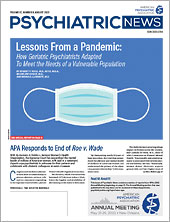Congress and the Biden administration must act immediately to protect abortion services, APA said in a statement responding to the Supreme Court’s Dobbs v. Jackson Women’s Health Organization in June.
The decision, which overturned the landmark 1973 decision in Roe v. Wade, leaves the legality and availability of abortions up to the states to determine.
“By dismantling nearly 50 years of legal precedent, the Court has jeopardized the physical and mental health of millions of American women and undermined the privacy of the physician-patient relationship,” APA’s statement reads.
The Dobbs decision is having a huge impact on women across the country, said Ludmila De Faria, M.D., chair of APA’s Committee on Women’s Mental Health. “Emotionally, unwanted pregnancy is associated with serious anxiety and distress,” she said. “Financially, women denied abortions acquire greater debt and have higher rates of bankruptcy and evictions.”
“It reduces a woman to a vessel,” said Nancy Byatt, D.O., M.S., M.B.A., a tenured professor of psychiatry, obstetrics/gynecology, and population and quantitative health sciences and director of the Lifeline for Families Center at UMass Chan Medical School and a member of APA’s Committee on Women’s Mental Health. “It is terrifying to consider the negative maternal and infant outcomes that will result from the pregnancies that women will be forced to carry to term.”
Dobbs Decision Will Fuel Health Inequities, APA Says
For decades, APA has held the position that abortion is a medical procedure and that physicians should respect patients’ freedom of choice. Most recently, in 2020 APA published a position statement expressing its opposition to any attempt to curtail family planning and abortion services.
In response to the Dobbs decision, APA also signed onto a statement with four partner organizations. “This ruling will curtail access to critical reproductive health care for millions of people across the country, will grow the health inequities that already exist in the medical system, and will set a dangerous precedent for legislative interference across medicine,” the statement reads. The partner organizations are the American Academy of Family Physicians, the American Academy of Pediatrics, the American College of Obstetricians and Gynecologists, and the American College of Physicians.
Additionally, APA joined with the American Psychological Association and the National Association of Social Workers in issuing a statement expressing the organizations’ “profound disappointment” that the Supreme Court rejected nearly 50 years of legal precedent by overturning Roe v. Wade.
“Decades of scientific research have shown that people who are denied abortions are more likely to experience higher levels of anxiety, lower life satisfaction, and lower self-esteem compared with those who are able to obtain abortion services,” the organizations wrote. “Our nation is already experiencing a mental health crisis. This is yet another factor that will contribute to negative mental health outcomes for our society.”
More than half of the women and girls of reproductive age in the United States have already lost, or are soon likely to lose, access to abortion due to the Dobbs decision, according to the New York Times. The decision may also have a chilling effect on access to reproductive health care, with some state legislators reportedly considering restricting access to birth control methods such as intrauterine devices (IUDs). Additionally, some patients have reported trouble accessing drugs used to treat autoimmune disorders that are also used to induce abortions in some cases.
“Abortions will continue,” said Kamalika Roy, M.D., chair of APA’s Caucus of Women Psychiatrists. “People with resources will not have problems accessing abortions. This decision worsens the marginalization that many women experience based on class, ethnicity, race, and immigration status.”
Denying Access to Abortion Harms Women’s Health
Dobbs v. Jackson Women’s Health Organization originated in 2018, when Jackson Women’s Health, the only abortion clinic in Mississippi, sued the state over a law banning abortions after 15 weeks of pregnancy. APA joined an amicus brief in the Dobbs case, along with numerous other medical organizations. “Mississippi’s attempt to ban nearly all abortions after 15 weeks of pregnancy is fundamentally at odds with the provision of safe and essential health care, scientific evidence, and medical ethics,” the amicus states.
In its brief, the state of Mississippi argued that abortion carries “significant … psychological risks.” APA and the other organizations stated in the amicus brief that there is no support for this claim. “Instead, evidence indicates that being denied a wanted abortion can have a detrimental impact on women’s mental health.”
Anti-abortion advocates and politicians often claim that abortions can cause significant mental health challenges for women, such as anxiety, depression, and posttraumatic stress. Yet research does not back up those claims. The amicus brief cites numerous long-term studies that found women who received abortions had “similar or better mental health outcomes” compared with those who were denied an abortion.
A 2018 study in the American Journal of Psychiatry led by M. Antonia Biggs, Ph.D., investigated five-year suicidal ideation trajectories among women who either received or were denied an abortion. Biggs is a senior researcher with Advancing New Standards in Reproductive Health at the University of California, San Francisco. She is also a researcher for the Turnaway study, a landmark longitudinal study following women after they received or were denied an abortion for five years. A long-standing argument against abortion is that women who have undergone the procedure experience serious mental health problems, including suicidal ideation. Using data from the Turnaway study, Biggs and colleagues found that there were no statistically significant differences on any suicidal ideation outcome between the two groups of women. In another study based on data from the Turnaway study, Biggs and her colleagues found that women who had been denied an abortion reported more anxiety, lower self-esteem, and lower life satisfaction compared with women who had received an abortion. The study was published in JAMA Psychiatry in February 2017.
The impact of the Dobbs decision has repercussions that will take time to fully comprehend. The first and most obvious impact will be increased morbidity and mortality, as women seek illegal and unsafe abortions, De Faria said.
Women with serious mental illness are at higher risk for unintended pregnancies, she added. “Women with severe and persistent mental illness are already a vulnerable group who are going to suffer more due to lack of safe family planning,” she said.
Making Patients’ Voices Heard
Psychiatrists have a responsibility to talk with their legislators and share the evidence that demonstrates how important it is to provide safe abortion care, Byatt said. There are also clinical implications psychiatrists should consider in the wake of the decision.
“We need to collaborate with our obstetric colleagues around how to manage and implement trauma-informed care in the context of these laws,” she said.
“Our psychiatric community also needs to consider how we will respond to and support patients who are forced to carry their pregnancies to term,” Byatt continued. “Similarly, we may need to find ways to identify women in labor and delivery units who were forced to take their pregnancies to term so we can support them and connect them with mental health care as indicated.”
Anything that compromises a person’s autonomy has psychological effects, Roy continued. In addition, lack of access to safe abortion services will change the trajectory of many patients’ lives. “Psychiatrists must prepare themselves to do research on the psychological impacts of this decision and to share that research with lawmakers,” she said. “We have a responsibility to make patients’ voices heard.” ■



